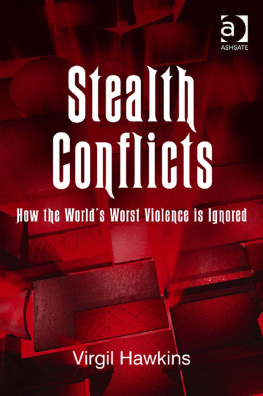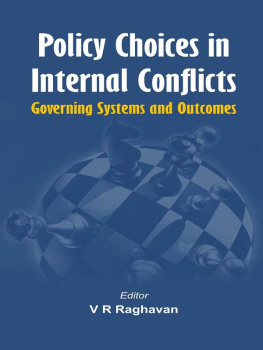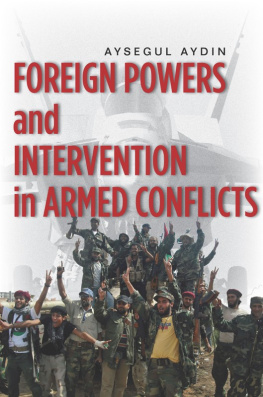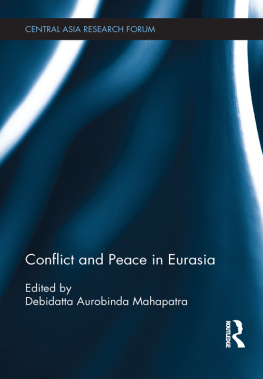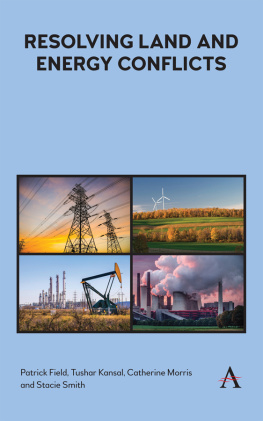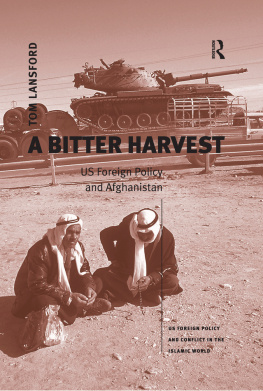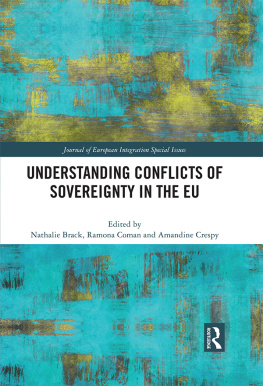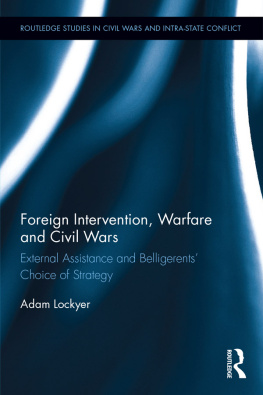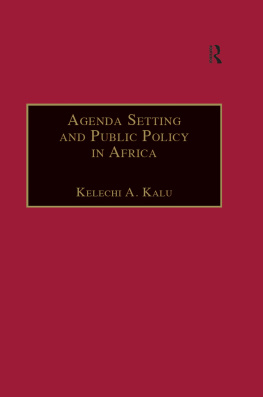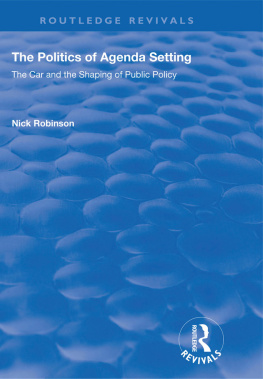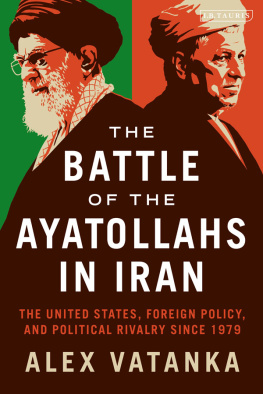STEALTH CONFLICTS
Most people are mirrors, reflecting the moods and emotions of the times; few are windows, bringing light to bear on the dark corners where troubles fester.
Sydney J. Harris
Stealth Conflicts
How the Worlds Worst Violence Is Ignored
VIRGIL HAWKINS
Osaka University, Japan
First published 2008 by Ashgate Publishing
Published 2016 by Routledge
2 Park Square, Milton Park, Abingdon, Oxon OX14 4RN
711 Third Avenue, New York, NY 10017, USA
Routledge is an imprint of the Taylor & Francis Group, an informa business
Copyright Virgil Hawkins 2008
Virgil Hawkins has asserted his right under the Copyright, Designs and Patents Act, 1988, to be identified as the author of this work.
All rights reserved. No part of this book may be reprinted or reproduced or utilised in any form or by any electronic, mechanical, or other means, now known or hereafter invented, including photocopying and recording, or in any information storage or retrieval system, without permission in writing from the publishers.
Notice:
Product or corporate names may be trademarks or registered trademarks, and are used only for identification and explanation without intent to infringe.
British Library Cataloguing in Publication Data
Hawkins, Virgil
Stealth conflicts : how the worlds worst violence is
ignored
1. Violence 2. War 3. World politics 4. International
relations
I. Title
303.609
Library of Congress Cataloging-in-Publication Data
Hawkins, Virgil.
Stealth conflicts : how the worlds worst violence is ignored / by Virgil Hawkins.
p. cm.
Includes bibliographical references and index.
ISBN 978-0-7546-7506-8
1. Violence--History--20th century. 2. International relations. 3. Security, International. 4. World politics--1989- 5. Conflict management. I. Title.
JC328.6.H39 2008
303.6--dc22
2008019103
ISBN: 9780754675068 (hbk)
Contents
ABC | Australian Broadcasting Corporation |
AFP | Agence France-Presse |
AP | Associated Press |
AU | African Union |
BBC | British Broadcasting Corporation |
CAP | Consolidated Appeal Process |
CNN | Cable News Network |
DPRK | Democratic Peoples Republic of Korea |
DRC | Democratic Republic of Congo |
ECOWAS | Economic Community of Western African States |
EU | European Union |
FTS | Financial Tracking System |
ICC | International Criminal Court |
ICJ | International Court of Justice |
IISS | International Institute for Strategic Studies |
IRC | International Rescue Committee |
LRA | Lords Resistance Army |
MLC | Movement for the Liberation of Congo |
MONUC | UN Organization Mission in the Democratic Republic of the Congo |
MSF | Mdecins Sans Frontires |
NATO | North Atlantic Treaty Organization |
NGO | Non-Governmental Organization |
OAU | Organization of African Unity |
OCHA | Office for the Coordination of Humanitarian Affairs |
PRIO | International Peace Research Institute, Oslo |
SIPRI | Stockholm International Peace Research Institute |
UCDP | Uppsala Conflict Data Project |
UK | United Kingdom |
UN | United Nations |
UNHCR | United Nations High Commissioner for Refugees |
UNITA | National Union for the Total Independence of Angola |
USA | United States of America |
WFP | World Food Programme |
The author would like to thank Shunsuke Suzuki, AMDA MINDS and all the staff at AMDA Zambia for generously allowing him to shift from a full-time position to a lengthy part-time position, giving him the time and environment needed to draft this book. He would also like to express his gratitude to the representatives from the policymaking, media and academic arenas who agreed to be interviewed, assisting the authors attempts to gain insights into the agenda-setting process, but who remain anonymous.
Thanks go to Kirstin Howgate, Margaret Younger, Jude Chillman, Nikki Dines and Alison Oughton at Ashgate for their assistance in the preparation of the manuscript and the production process of this book. The author would also like to convey his profound appreciation to Michelle Hawkins for her tireless work in proof-reading the final manuscript and enhancing its clarity. Any errors that remain in the text are, of course, entirely the authors own. Special thanks go to Yasmin Hawkins and Thomas Mabwe for conducting surveys, and to Reiko Okumura for assistance in compiling data. Last but not least, the author would like to thank Kaoru for her constant support, without which this book would not have been possible.
In January 2008, it became known that 5.4 million people had died because of conflict in the Democratic Republic of Congo (DRC), the vast majority from preventable disease and starvation (IRC 2008). Not only is it by far the deadliest conflict in the world today, it is the deadliest of the past half-century. It began in August 1998, in the form of a Rwandan-led invasion (joined by Uganda, and, to a lesser extent, Burundi), ostensibly in support of a number of local rebellions. It was a lightning strike consisting of an eastern front beginning from the areas bordering the invading states, and a western front that commenced with the hijacking of civilian planes in the east, which were used to ferry hundreds of soldiers to a military base west of Kinshasa, who then joined with disgruntled forces there to occupy the Inga Dam and move on the capital. Five African countries came to the aid of the DRC government, and a combination of Angolan, Zimbabwean and DRC troops were able to stop the advance on the capital and shut down the western front. The eastern advance was eventually halted as well, resulting in a stalemate that left the country (the size of Western Europe) effectively cut in half. Although foreign troops had withdrawn by 2003, and the conflict has largely subsided, violence has continued from overlapping local and national conflicts (that accompanied the international conflict), insecurity and human rights abuse are rife in parts of the country, and the abysmal humanitarian conditions resulting from the conflict continue to cause levels of death and suffering unparalleled anywhere else in the world.

